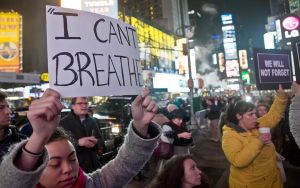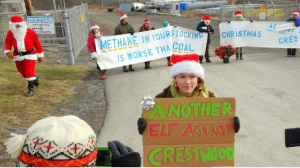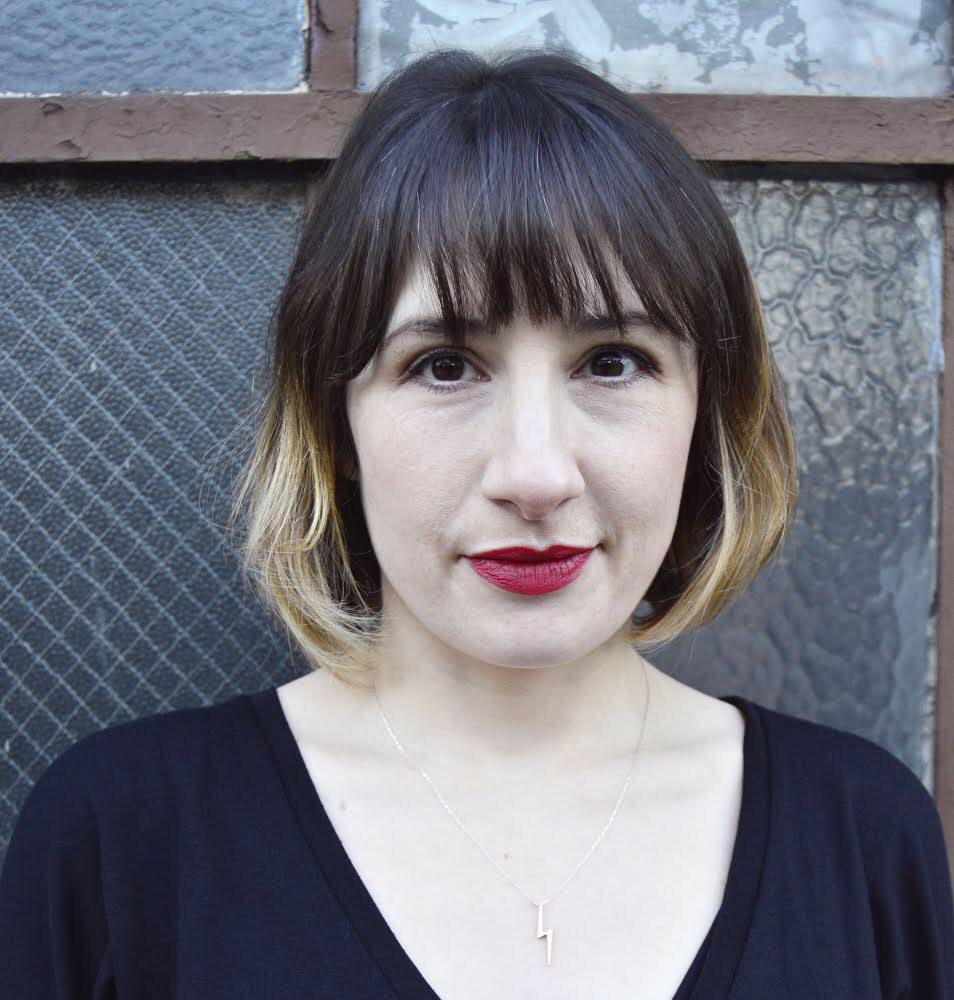
Protesters in Times Square carry signs in reaction to a non indictment against a police officer in the death of Eric Garner, Wednesday Dec. 3, 2014 in New York. (AP Photo/Bebeto Matthews)
But there were others too. Activists in cities and towns large and small stood up and made themselves heard this year on issues from climate change, to low wages, to our government’s continued support of the bloated financial institutions that broke the economy not long ago. Here are just a few that you might not have heard about.
No Fracking in New York
Day after day, from October through December, citizens from New York’s Finger Lakes region braved the elements to blockade the entrance of the Texas-based energy company, Crestwood Midstream. Crestwood had planned to build a natural gas storage facility adjacent to Seneca Lake, a source of local drinking water that also benefits the region’s tourism and wine-making sectors. In the cold and rain, they sang songs, arms locked, until police arrested them. When New York Governor Andrew Cuomo announced a statewide ban on hydraulic fracturing earlier this month, it was the hard work, commitment and struggle of activists like those in the Finger Lakes region, as much as the science the governor spoke of, that won this fight.
Blowing the Whistle on Predatory Lending
This year, rank and file bank workers protested against Wells Fargo, connecting their struggles on the job with the struggles of customers. In April, as part of a national day of action to press Wells Fargo on its predatory lending and continuing foreclosures, bank workers organizing with the Committee for Better Banks joined community members to speak out in 30 locations around the country. Jonnelle Rodriguez, a former Wells Fargo teller who protested in Irvington, New Jersey, summed up the mood: “I know firsthand how unreasonable sales goals force bank workers to push financial products onto customers who don’t need them. Wells Fargo is reaping record profits while their low-wage bank workers do the dirty work of exploiting their customers.”
Striking the “Sharing Economy”
The so-called “sharing economy” was a big topic for discussion in 2014 as companies like Uber, which connects people who need a ride to people who will drive them for a fee (and yes, that sounds more like a taxi driver job than a new and exciting form of “sharing”), continued to expand. Some Uber drivers, tired of the hype and the long hours necessary to make ends meet, began organizing with help from the Teamsters. In October, drivers in at least five cities made a statement by turning off their apps and refusing to take passengers in what was called the “sharing economy’s first strike.” Rebecca Burns at In These Times noted, “When tech magnates extol ‘disruption,’ of course, they likely aren’t talking about the sort caused by labor actions.”
Healthcare is a Human Right
As the Affordable Care Act exchanges rolled out and the left and right debated market-based healthcare reform, a group of activists in several states aimed to shift the debate entirely. Following the lead of Vermonters, who got a law passed in 2011 that would build a single-payer system in their state (and who are protesting now that their governor has backed off that promise), organizers in states including Maryland, Maine and Pennsylvania began building a movement for a national healthcare program that would truly serve everyone. Going door-to-door, tabling at county fairs, and meeting people one-on-one to talk about what healthcare means to them, they often found that people from vastly different political perspectives can agree on one thing: healthcare is a human right.
Students Strike So Teachers Don’t Have To
In the latest attack on Philadelphia’s school system, Republican Gov. Tom Corbett’s state-led School Reform Commission unilaterally voided contracts with the Philadelphia Federation of Teachers. Observers immediately began to speculate as to whether the teachers would strike in response. But before they could act, a couple of students posted a call on Facebook for action. Hundreds of students walked out of class October 8, danced and sang outside their schools, and handed out flyers demonstrating support for their teachers. The Federation of Teachers union challenged the School Reform Commission’s cancellation of its contract in a Philadelphia court and received an injunction temporarily preventing the implementation of the changes proposed on Oct. 6.




